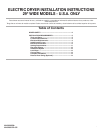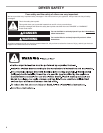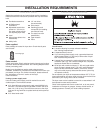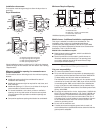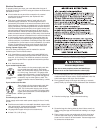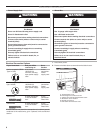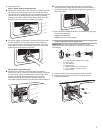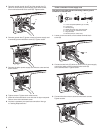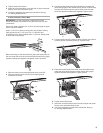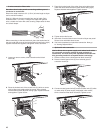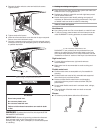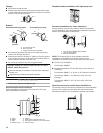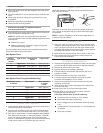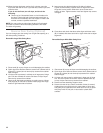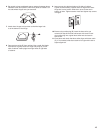
5
Install Leveling Legs
WARNING
Excessive Weight Hazard
Use two or more people to move and install dryer.
Failure to do so can result in back or other injury.
1. To avoid damaging the oor, use a large at piece of
cardboard from the dryer carton. Place cardboard under the
entire back edge of the dryer. See illustration.
2. Firmly grasp the body of the dryer (not the top or console
panel). Gently lay the dryer on the cardboard. See illustration.
3. Examine leveling legs. Find the diamond marking.
4. Screw the legs into the leg holes by hand. Use a wrench to
nish turning the legs until the diamond marking is no longer
visible.
5. Place a carton corner post under each of the 2 dryer back
corners. Stand the dryer up. Slide the dryer on the corner
posts until it is close to its nal location. Leave enough room
to connect the exhaust vent.
Electrical Connection
To properly install your dryer, you must determine the type of
electrical connection you will be using and follow the instructions
provided for it here.
If local codes do not permit the connection of a neutral ■
ground wire to the neutral wire, see “Optional 3-wire
connection” section.
This dryer is manufactured ready to install with a 3-wire ■
electrical supply connection. The neutral ground wire is
permanently connected to the neutral conductor (white wire)
within the dryer. If the dryer is installed with a 4-wire electrical
supply connection, the neutral ground wire must be removed
from the external ground connector screw (green screw), and
secured under the neutral terminal (center or white wire) of
the terminal block. When the neutral ground wire is secured
under the neutral terminal (center or white wire) of the terminal
block, the dryer cabinet is isolated from the neutral conductor.
A 4-wire power supply connection must be used when the ■
dryer is installed in a location where grounding through the
neutral conductor is prohibited. Grounding through the neutral
is prohibited for (1) new branch-circuit installations, (2) mobile
homes, (3) recreational vehicles, and (4) areas where local
codes prohibit grounding through the neutral conductors.
If using a power supply cord:
Use a UL listed power supply cord kit marked for use with
clothes dryers. The kit should contain:
A UL listed 30-amp power supply cord, rated 120/240 volt ■
minimum. The cord should be type SRD or SRDT and be at
least 4 ft. (1.22 m) long. The wires that connect to the dryer
must end in ring terminals or spade terminals with upturned
ends.
A UL listed strain relief. ■
If your outlet looks like this:
If your outlet looks like this:
If connecting by direct wire:
Power supply cable must match power supply (4-wire or 3-wire)
and be:
Flexible armored cable or nonmetallic sheathed copper cable ■
(with ground wire), protected with exible metallic conduit. All
current-carrying wires must be insulated.
10-gauge solid copper wire (do not use aluminum). ■
At least 5 ft. (1.52 m) long. ■
Then choose a 4-wire power supply cord with
ring or spade terminals and UL listed strain
relief. The 4-wire power supply cord, at least 4
ft. (1.22 m) long, must have 4 10-gauge solid
copper wires and match a 4-wire receptacle of
NEMA Type 14-30 R. The ground wire (ground
conductor) may be either green or bare. The
neutral conductor must be identied by a white
cover.
Then choose a 3-wire power supply cord with
ring or spade terminals and UL listed strain
relief. The 3-wire power supply cord, at least
4 ft. (1.22 m) long, must have 3 10-gauge solid
copper wires and match a 3-wire receptacle of
NEMA Type 10-30R.
4-wire receptacle
(14-30R)
3-wire receptacle
(10-30R)



